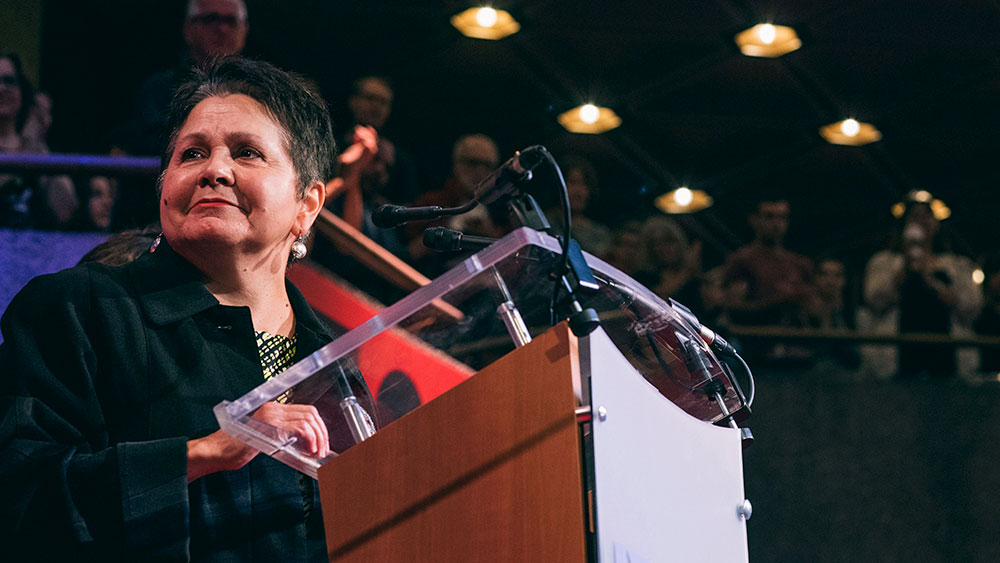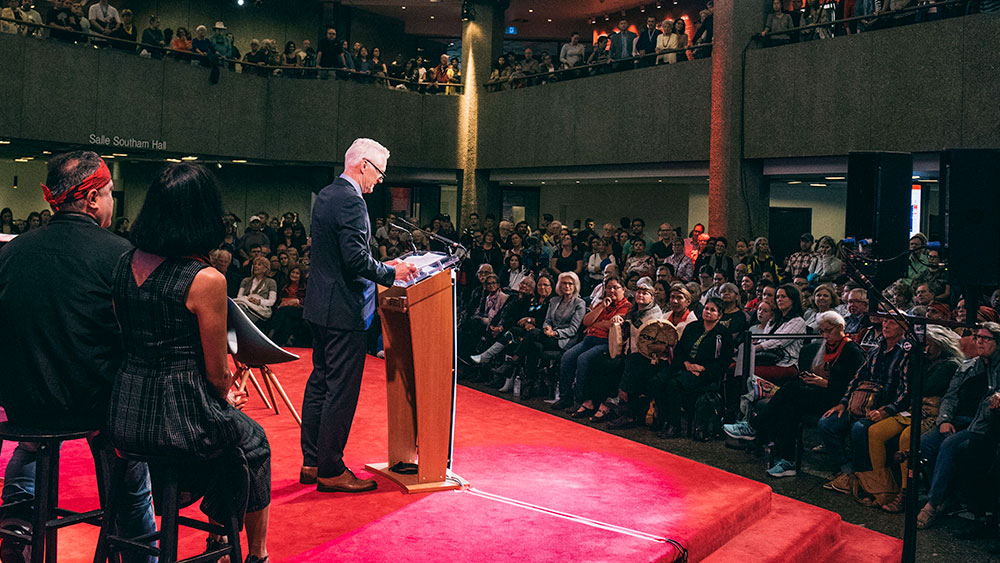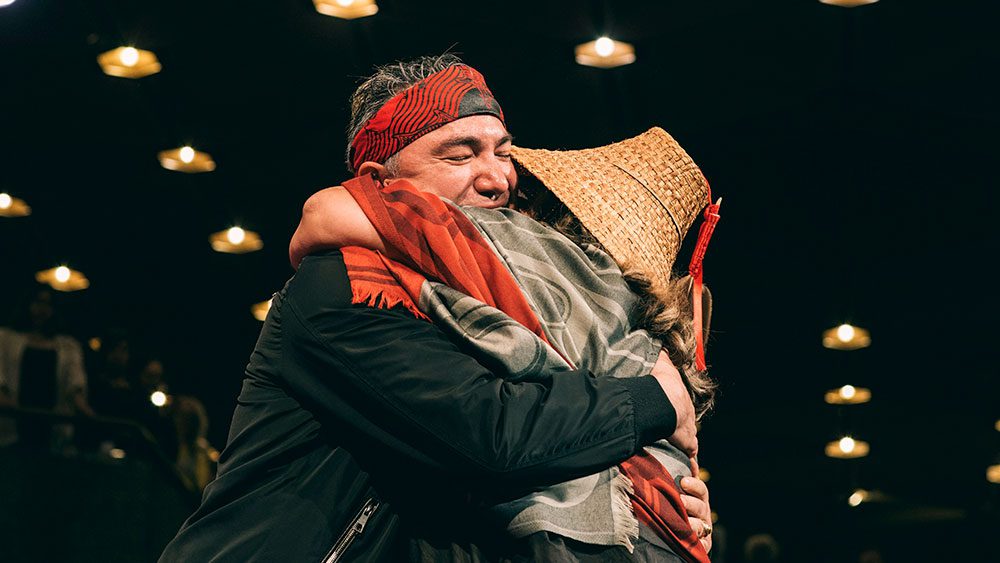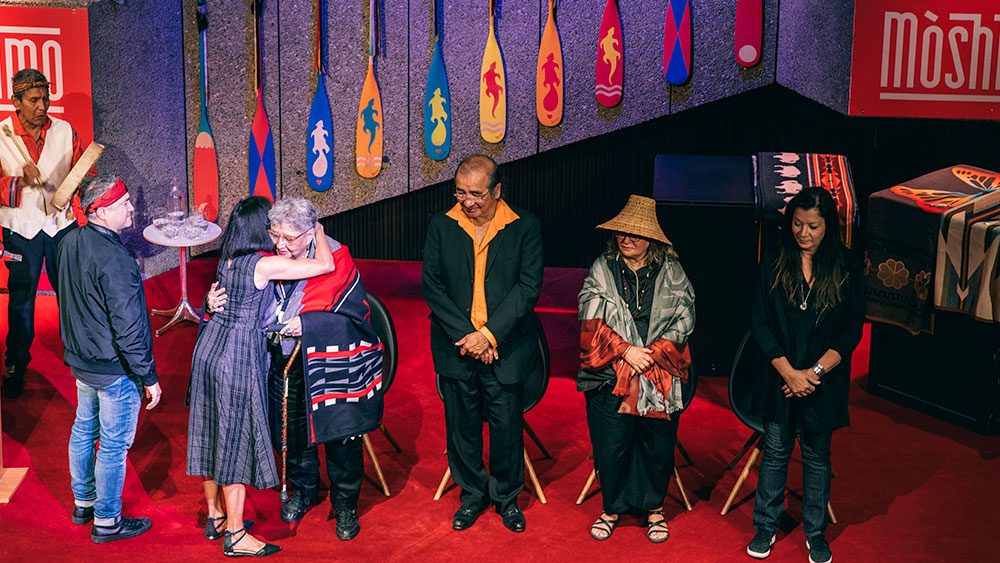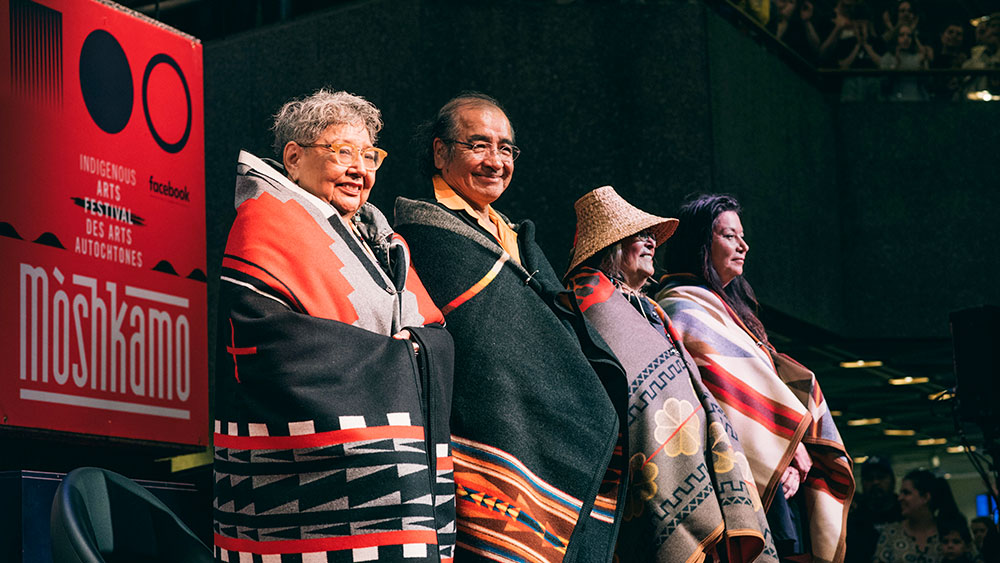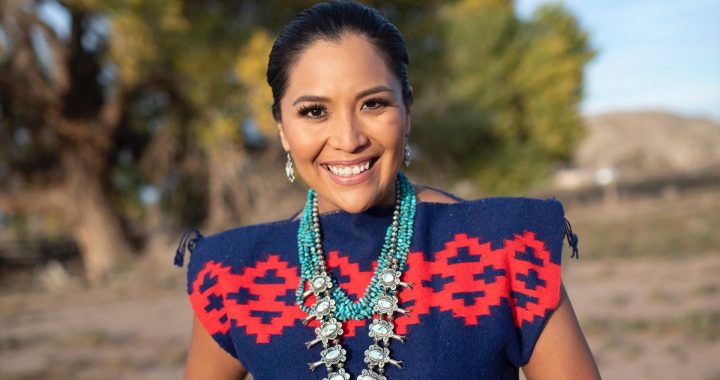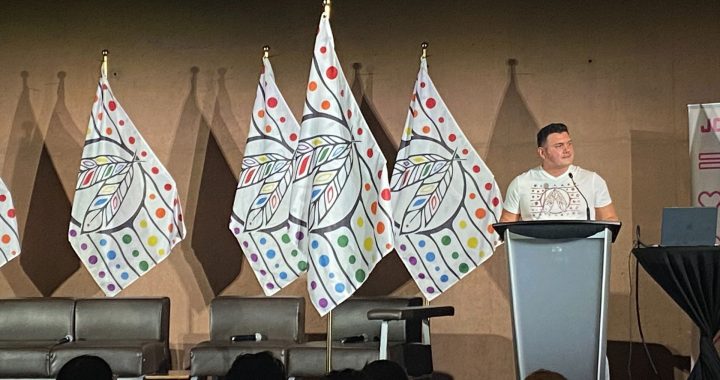Shelby Lisk and Annette Francis
APTN News
On a grey Saturday morning, dozens of canoers sat on the edge of the Rideau Canal just outside downtown in Ottawa waiting to make the historic journey to the National Arts Centre to officially open the Indigenous theatre festival, Mòshkamo.
The paddlers included Algonquin Elders and Algonquin Anishinabeg Nation community members, along with NAC staff.
(Artistic Director, Kevin Loring, waves from his canoe during the procession along the Rideau Canal to open the NAC Indigenous theatre Mòshkamo festival. Shelby Lisk/APTN)
“I was so honoured, so deeply profoundly proud. No words to describe that feeling I had when I saw my people, our people, journey in that water. A practice we’ve been doing since time immemorial,” said Algonquin Elder Claudette Commanda.
“Some of us did not go into a canoe, but let me tell you, each and every one of us that are here right now at this moment, we are in that canoe, in spirit, in heart, in respect, love and kindness. Let us paddle that canoe together in peace and friendship.”
(Claudette Commanda beams with pride as she welcomes everyone on behalf of the Algonquin Nation. Shelby Lisk/APTN)
For the Algonquin Elder, the work that the National Arts Centre has done, with Kevin Loring, Artistic Director of Indigenous Theatre, and Lori Marchand, Manager Director of Indigenous Theatre at the helm, is profound and unprecedented.
While she welcomed everyone on behalf of the Algonquin Nation, she shared her gratitude to the NAC.
“Thank you to the leaders of the National Art Centre. I truly appreciate that, we truly appreciate that and we know that indeed this is a true action of the rights relationship that was always intended between our ancestors and your ancestors,” said Commanda.
(NAC President and CEO, Christopher Deacon, addresses the packed crowd in the Canal Lobby at the NAC for the opening of the Mòshkamo festival. Shelby Lisk/APTN)
NAC President and CEO, Christopher Deacon, took the stage to acknowledge the work that has been going on behind the scenes to bring Mòshkamo to life.
He thanked the many people who have made this historic opening possible, including the Assembly of First Nations, Métis National Council, Inuit Tapiriit Kanatami, the Native Women’s Association of Canada, Grand Chief Verna Polson and the Algonquin advisory council, who played a critical role in consulting with the NAC in the development of the Indigenous theatre.
He said Indigenous theatre is taking its rightful place next to the well-established English and French theatres at the NAC.
“Today, 50 years after the NAC’s grand opening, our engagement with Indigenous artists and commitment to their work has arrived at a new place. Our new commitment, made today, is to have Indigenous artists lead the creation and performance of Indigenous stories, music and dance,” said Deacon.
Kevin Loring was appointed Artistic Director on June 15, 2017 and has spent the last two years travelling the country to see Indigenous work and meet with artists and arts organizations.
Performing arts organizations from around the world have now started to contact Loring to consult on how to empower Indigenous arts in their own countries.
Loring, Nlaka’pamux from British Columbia’s Lytton First Nation, brought traditions from his home community to the opening, with a traditional blanketing ceremony to honour four Indigenous theatre trailblazers – Muriel Miguel, Tomson Highway, Margo Kane and Marie Clements.
(Kevin Loring hugs performing artist and writer, Margo Kane, as he brings her on stage to honour her work. Shelby Lisk/APTN)
With each actor, director or playwright they brought on stage, they told stories of how those visionaries influenced their own work and guided them to the place they are now – making history for Indigenous people at the NAC.
(Lori Marchand hugs Muriel Miguel during the blanketing ceremony for four Indigenous artists: Muriel Miguel, Tomson Highway, Margo Kane and Marie Clement. Shelby Lisk/APTN)
“We are honouring today, artists that have had a personal impact on the two of us. On our trajectory, on our artistry. They’ve blazed the trails that we walk on today. This exists because they have existed. This exists because they fought the battles that needed to be fought,” said Loring.
“This exists because of their love and today we are going to reflect that love back to them.”
The artists that were honoured included Kuna/Rappahannock choreographer, director and actor Muriel Miguel, Cree playwright and author Tomson Highway, Cree/Saulteaux performing artist and writer Margo Kane, and Métis playwright, performer, director, producer and screenwriter Marie Clement.
Marchand and Loring both told personal stories about the artists as they brought them on stage.
Marchand, a member of the Syilx (Okanagan) First Nation, mused about the first time she met Muriel Miguel at Native Earth performing arts, saying that it was the first time in her life that she had been in a room “full of people like herself”.
Loring described his first encounter with Tomson Highway’s work as the first Indigenous play he ever read in his life.
He performed a monologue from Highway’s play, Dry Lips Oughta Move to Kapuskasing, for his university class in Kamloops, B.C.
“In that moment, I became an artist and that is all thanks to Tomson Highway,” said Loring.
Loring and Marchand reminded us all that this profound historic moment for the NAC Indigenous theatre comes from the years of hard work of Indigenous artists that came before.
(Muriel Miguel, Tomson Highway, Margo Kane and Marie Clements stand proud with their gifted blankets. Shelby Lisk/APTN)
The Mòshkamo festival continues until September 29, with shows, workshops and masterclasses, including the play the unnatural and accidental women written by Marie Clements and directed by Muriel Miguel.




